Weekend Diversion: A better world, effortlessly
Make the world a better place — fighting disease and poverty while helping move science forward — with your computer’s spare time!
Image credit: The Charity Engine, via slideshare.net.
“While we do our good works let us not forget that the real solution lies in a world in which charity will have become unnecessary.” –Chinua Achebe
Until that day comes, many of us struggle with how to devote our altruistic efforts: towards advancing humanity in a way that impacts all of us, or more strongly addressing the needs of those who are among the less fortunate? It’s a difficult ethical question with no easy answer, and that’s part of why I think that no matter where you devote your charitable efforts, you should take heart that you’re doing something to make a positive difference in this world. Have a listen to Beirut’s song, Mount Wroclai (Idle Days),
while I tell you about a project that you can participate in, idly, and with practically no effort, to make the world a better place no matter how you like to devote your efforts: Charity Engine.
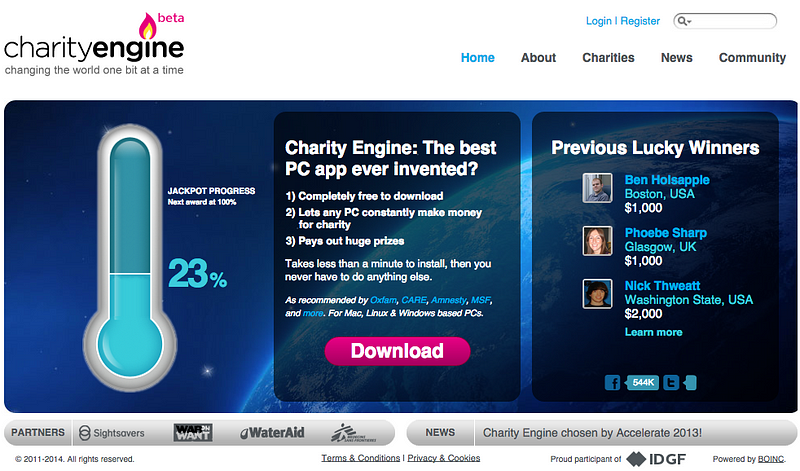
When we think about cloud computing, we normally think of storing and sharing files in some nebulous cyberspace, where they can always be accessed, retrieved and used from anywhere in the world. On the other hand, when we think about massive computational, scientific undertakings, we think of huge supercomputers, numerical simulations and on-site warehouses.
All of that has been changing since the 1990s, however, with the advent of individual projects such as Einstein@Home, SETI@Home and Malaria Control.
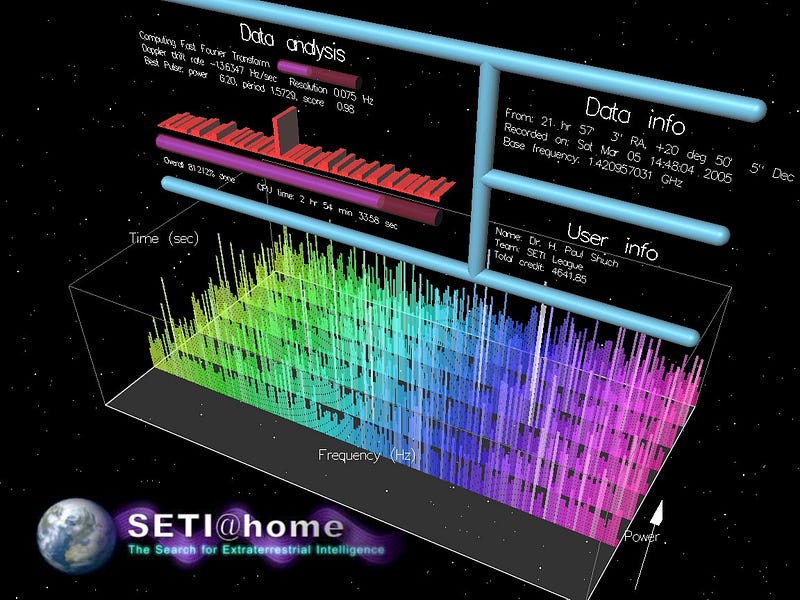
The basic idea is that there are huge data sets that numerous scientific and health enterprises have accumulated, and specialized pieces-and-packages of software that have been developed to analyze the data bit-by-bit. But the computational resources required to do the entire project are far beyond the resources available.
And that’s where BOINC, the Berkeley Open Infrastructure for Network Computing, comes in. It allows home users — people like you and I — to:
- download the package and small bits of the data,
- have our own PC, Mac or Linux boxes perform the computational analysis using our processors’ spare CPU cycles,
- and then upload the completed data back to the main project.
Because no one has to buy any additional hardware (it uses what you have), the return-on-investment is huge!
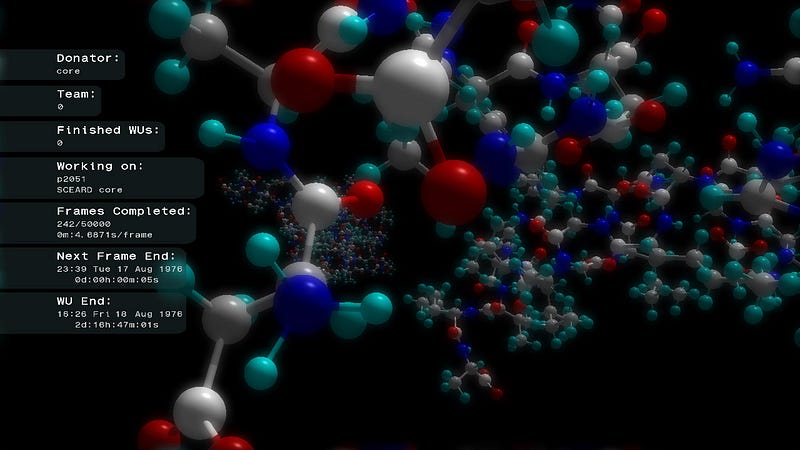
The end user pays only the cost of electricity (pennies-per-day), but the amount of computation work done would cost about 10-to-20-fold for the companies themselves to do it in-house. Because of this huge savings, it was only a matter of time before someone figured out how to turn this into a win-win for everyone involved.
And that’s exactly what Charity Engine is! As they themselves say:
Charity Engine takes enormous, expensive computing jobs and chops them into 1000s of small pieces, each simple enough for a home PC to work on as a background task. Once each PC has finished its part of the puzzle, it sends back the correct answer and earns some money for charity – and for the prize fund. (It also earns more chances to win.)
Where does the money come from? Science and industry. The grid is rented like a giant supercomputer, then all the profits shared 33–33–33 between the charities, the company and the lucky prize winners.
Charity Engine typically adds less than 10 cents per day to a PC’s energy costs and can generate $10-$20 for charity – and the prize draws – for each $1 of electricity consumed.
It is the most efficient way to donate to charity ever invented.
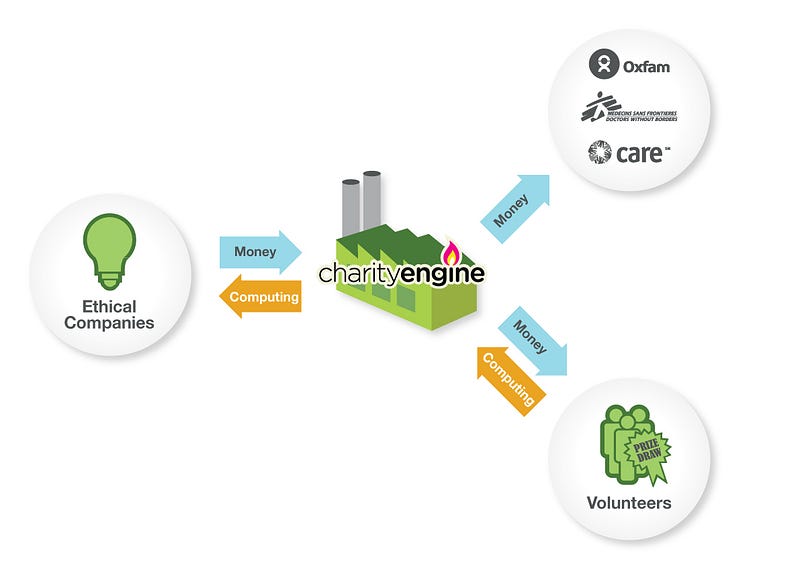
By pairing charities with computational resources through its users — some through BOINC and some through other computational initiatives — Charity Engine has figured out a way to:
- make money by renting the grid to ethical business partners,
- help charities (with money) and scientific not-for-profits (with computational power), and
- reward its individual users who contribute CPU-cycles with cash (lottery-style) prizes! (Every few months, someone wins $1000+!)
They’ve recently added Rosetta@Home to the list of projects that they serve — that’s the scientific, health and medicine protein-folding program to compute how proteins will spontaneously develop tertiary and quaternary structures — and have literally quadrupled the number of active users helping with their computational efforts!
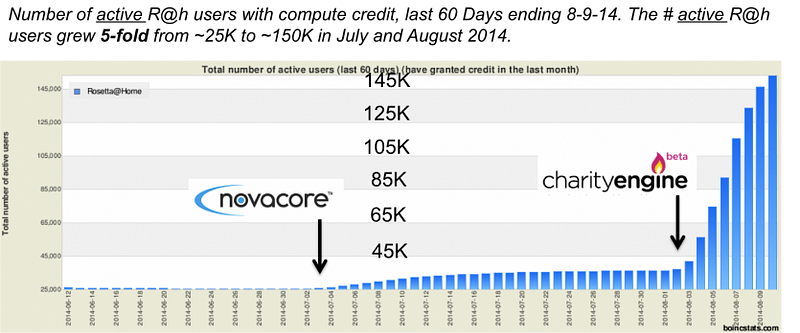
I can also personally vouch for just how good the projects that Charity Engine chooses are: I’m their science advisor! And although I’m not necessarily the expert when it comes to the quality of the charities involved, all the (armchair) research I’ve done shows that they’re unimpeachable when it comes to their integrity, including CARE International, one of the biggest three aid agencies in the world. Check them for yourself if you like!
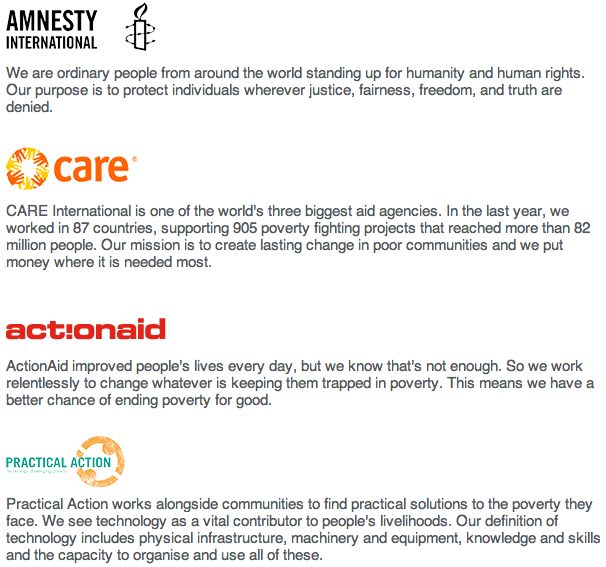
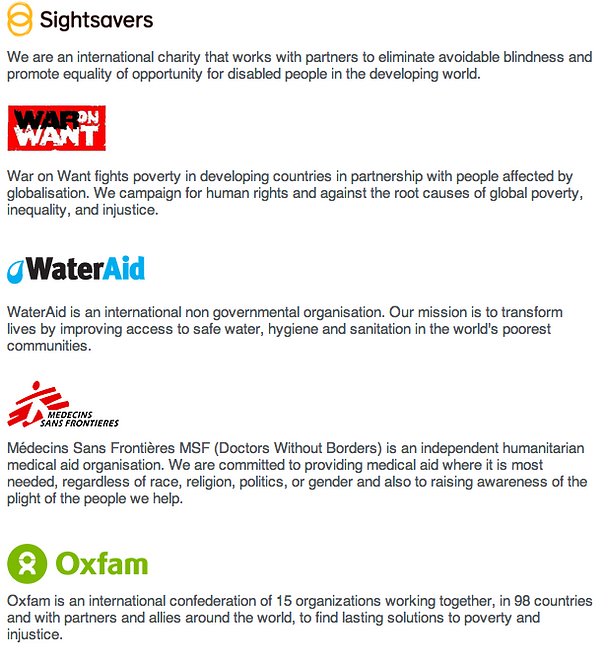
All in all, they’ve got an impressive array of charity partners, and a strict commitment to only rent the grid to ethical users, and to treat you, the donor, ethically, too. For those of you interested in some of the other science they do, they also help the LHC, climate prediction, the RNA world program, earthquake prediction and more.
Want to see more? Check out their slideshares here and here, and then watch the quick video below.
And then go ahead and download the latest version of the software (that takes advantage of your GPU as well), and give them a follow on Twitter and Google+, where I’m simply baffled that they don’t have more! (Will there be an Android app? Yes, and hopefully soon!) And if you’re worried about it slowing your machine down, it’s fully customizable, so you can control when it does and doesn’t turn on.
So help the world, help science, and take a chance at helping yourself, too! If you’re already using BOINC, simply enter your account when you register and it’ll be automatically integrated. It’s an easy way to simply do good in the world, for something that costs us all almost nothing. Thanks for considering it (download / login / register here), and don’t just have a great weekend, but help everyone across the world while you do!
Leave your comments at the Starts With A Bang forum on Scienceblogs, and if you missed the best of our comments of the week (and responses), check them out here!





